
jentic-public-apis
The open knowledge layer for AI agents and APIs
Stars: 189
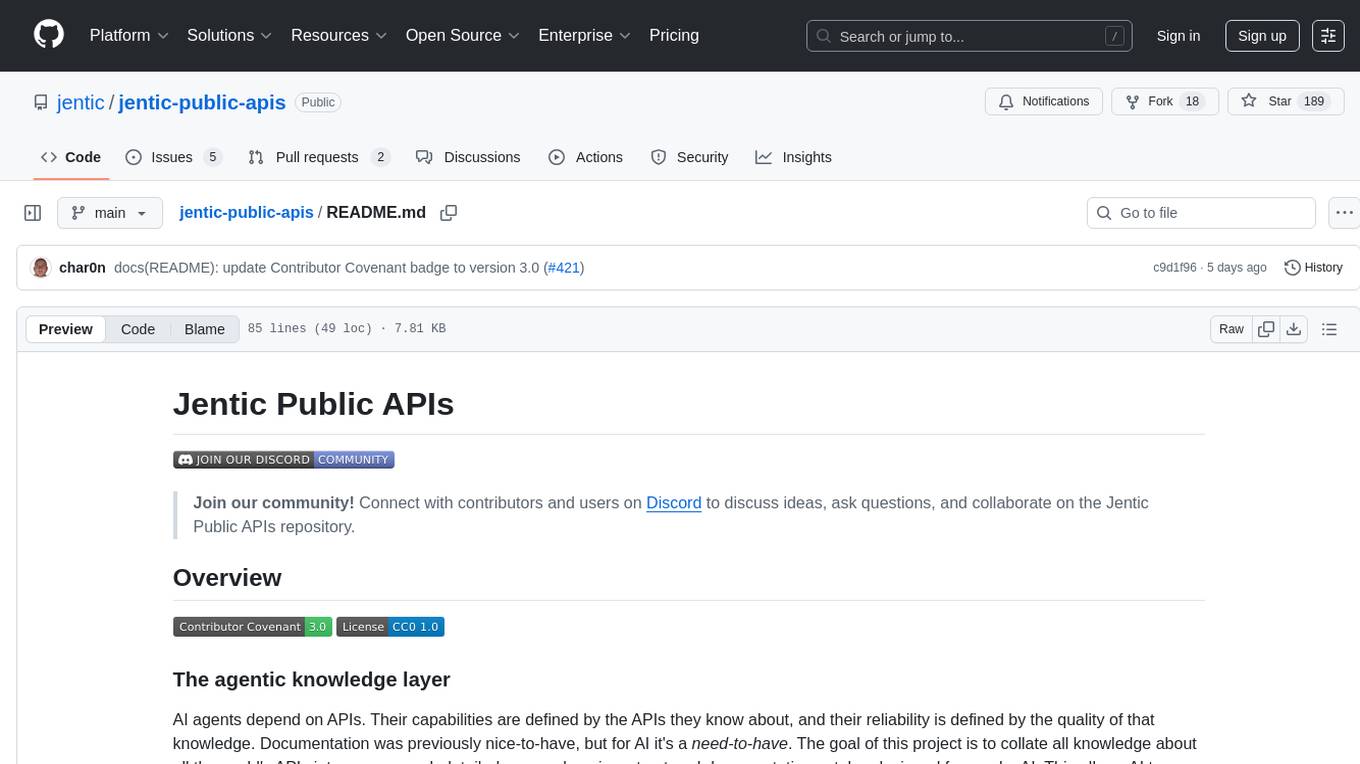
The Jentic Public APIs repository aims to collate all knowledge about the world's APIs into a detailed, comprehensive, structured documentation catalog designed for use by AI. It focuses on standardized OpenAPI specifications, Arazzo workflows, associated tooling, evaluations, and RFCs for extensions to open formats. The project is in ALPHA stage and welcomes contributions to accelerate the effort of building an open knowledge foundation for AI agents.
README:
Join our community! Connect with contributors and users on Discord to discuss ideas, ask questions, and collaborate on the Jentic Public APIs repository.
AI agents depend on APIs. Their capabilities are defined by the APIs they know about, and their reliability is defined by the quality of that knowledge. Documentation was previously nice-to-have, but for AI it's a need-to-have. The goal of this project is to collate all knowledge about all the world's APIs into a communal, detailed, comprehensive, structured documentation catalog designed for use by AI. This allows AI to accurately generate API integration code, and it allows agents to plan and interact with APIs reliably, without intermediaries.
This communal effort requires a stable but extensible representation format that can describe all salient aspects of APIs and associated workflows in full detail. The OpenAPI specifications provide the de-facto standard for formal API descriptions, are widely adopted, supported by a vast ecosystem of associated tooling, and governed by the Linux Foundation. Importantly, the OpenAPI Initiative's most recent specification, Arazzo, allows complex multi-API workflows to be described in a declarative format.
We previously launched the OAK (Open Agentic Knowledge) initiative, proposing a type of open-source catalog of API and workflow descriptions that builds upon these open standards to contribute API and workflow knowledge to AI agents. This repository is the first such OAK repository, and we welcome others to create their own. We will coordinate with the OpenAPI community, and propose an RFC containing various extensions to capture additional knowledge that is especially relevant in the context of AI agents (for example concerning authentication, rate limiting, pricing, governance and safety). See OAK.md for more information about this initiative, and how to create your own OAK repository linked to this initiative. If you have suggestions to improve the OAK initiative, we welcome discussion on our Discord and PRs on the OAK.md file in this repository.
Documenting all the world's API knowledge is made achievable by generative AI. Our starting point was OpenAPI documents provided by various vendors online (with special credit to the APIs.guru repository). On top of this, we have generated thousands Arazzo workflows using AI. We are growing this repository using AI agents to import (and improve) existing OpenAPI documents and to generate new OpenAPI specifications where no structured documentation previously existed. Our AI agents are also discovering novel Arazzo workflows that can be performed on top of that API knowledge. We will propose a scorecard evaluation to measure the quality of the generated documentation, allowing us to ensure that both the quantity and the quality of documentation increases as we progress.
We welcome all contributions from the community and from partners who want to accelerate this effort with their own resources and ingenuity. We will ensure that all contributions help the knowledge about each API and workflow in the repository to converge on the best canonical version.
The repository focuses on:
- Standardized OpenAPI specifications for public APIs
- Arazzo workflows that define composable operations across one or more APIs
- Associated tooling, for example to help import and enrich documentation, or to convert it out into other formats (e.g., AI model provider's tool definition formats).
- Evaluations and scorecards to measure API knowledge completeness, accuracy and AI-readiness
- RFCs for extensions to open formats used in the repository, and any other proposals.
Note: This project is currently in ALPHA.
- OAK.md - The OAK manifesto: principles and vision behind the Open Agentic Knowledge (OAK) initiative.
- STRUCTURE.md - The OAK (Open Agentic Knowledge) Standard for repository structure
- FEEDBACK-FILES.md - Documentation of feedback.json files that track API specification repairs
- CONTRIBUTING.md - Guidelines for contributing to the repository
- CODE_OF_CONDUCT.md - Community standards and expectations
- LICENSE.md - CC0 1.0 License for this repository
This repository follows the OAK (Open Agentic Knowledge) Standard, which defines a standardized directory structure for organizing API specifications and workflows.
- API specifications are organized by vendor and version
- Workflows are organized to clearly show which APIs they reference
- Multi-API workflows demonstrate how different services can be orchestrated together
For detailed information, please refer to the OAK Standard documentation.
The Jentic Public APIs project is built upon the foundation of open standards and community contributions. We extend our sincere gratitude to:
The OpenAPI Initiative and Linux Foundation - For creating, maintaining, and governing the OpenAPI Specification and Arazzo standards that form the backbone of this project. The OpenAPI Initiative's commitment to open standards, extensive ecosystem of tooling, and collaborative governance model directly enable our vision of a communal API knowledge layer. Special recognition goes to the technical steering committee and contributors who have developed these specifications to serve as the de-facto standard for API documentation, making structured, machine-readable API descriptions possible at scale.
APIs.guru - For providing the initial collection of OpenAPI specifications that helped bootstrap this repository. Their dedication to cataloging public APIs has been instrumental in our mission to create an open knowledge foundation for AI agents, and their pioneering work in API discovery laid important groundwork for projects like ours.
The broader API community - Including all the API providers, documentation authors, and open source contributors whose work makes comprehensive API knowledge possible. This project represents a continuation of the collaborative spirit that has driven API standardization and tooling development.
We are committed to contributing back to these communities through our proposed RFCs, quality improvements to existing specifications, and by demonstrating new applications of these open standards in the context of AI agents.
We welcome contributions from the community! Whether you're enhancing existing API specifications, creating new Arazzo workflows, or improving documentation, your contributions help build the open knowledge foundation for AI agents.
Please read our Contributing Guidelines for more information on how to get started.
This project is licensed under the CC0 1.0 License - see the LICENSE.md file for details.
Disclaimer: API specifications and workflows in this repository are based on publicly documented third-party APIs, with some modifications such as repairs to OpenAPI specs or creation of new specs from public API documentation. All trademarks and service marks are the property of their respective owners. This repository does not grant rights to use the underlying APIs.
For Tasks:
Click tags to check more tools for each tasksFor Jobs:
Alternative AI tools for jentic-public-apis
Similar Open Source Tools

jentic-public-apis
The Jentic Public APIs repository aims to collate all knowledge about the world's APIs into a detailed, comprehensive, structured documentation catalog designed for use by AI. It focuses on standardized OpenAPI specifications, Arazzo workflows, associated tooling, evaluations, and RFCs for extensions to open formats. The project is in ALPHA stage and welcomes contributions to accelerate the effort of building an open knowledge foundation for AI agents.

xef
xef.ai is a one-stop library designed to bring the power of modern AI to applications and services. It offers integration with Large Language Models (LLM), image generation, and other AI services. The library is packaged in two layers: core libraries for basic AI services integration and integrations with other libraries. xef.ai aims to simplify the transition to modern AI for developers by providing an idiomatic interface, currently supporting Kotlin. Inspired by LangChain and Hugging Face, xef.ai may transmit source code and user input data to third-party services, so users should review privacy policies and take precautions. Libraries are available in Maven Central under the `com.xebia` group, with `xef-core` as the core library. Developers can add these libraries to their projects and explore examples to understand usage.
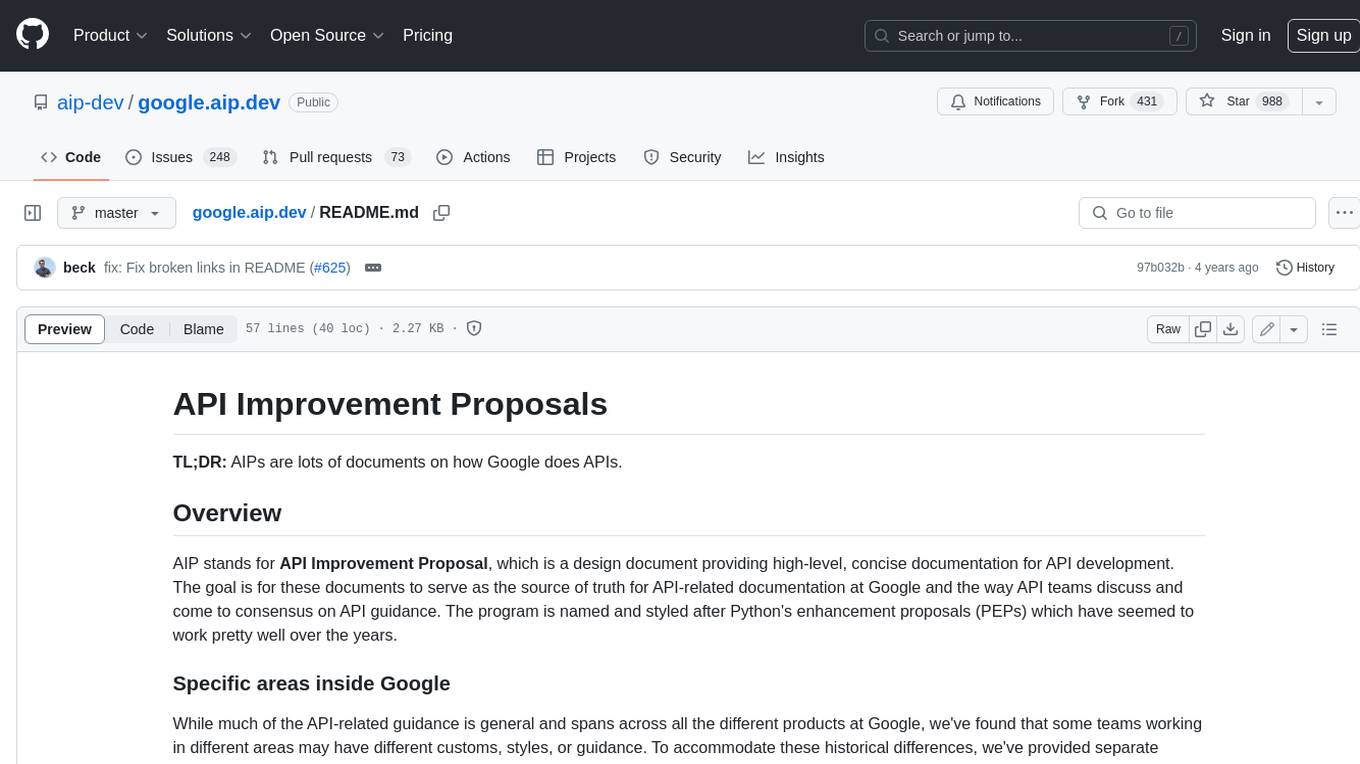
google.aip.dev
API Improvement Proposals (AIPs) are design documents that provide high-level, concise documentation for API development at Google. The goal of AIPs is to serve as the source of truth for API-related documentation and to facilitate discussion and consensus among API teams. AIPs are similar to Python's enhancement proposals (PEPs) and are organized into different areas within Google to accommodate historical differences in customs, styles, and guidance.

NaLLM
The NaLLM project repository explores the synergies between Neo4j and Large Language Models (LLMs) through three primary use cases: Natural Language Interface to a Knowledge Graph, Creating a Knowledge Graph from Unstructured Data, and Generating a Report using static and LLM data. The repository contains backend and frontend code organized for easy navigation. It includes blog posts, a demo database, instructions for running demos, and guidelines for contributing. The project aims to showcase the potential of Neo4j and LLMs in various applications.
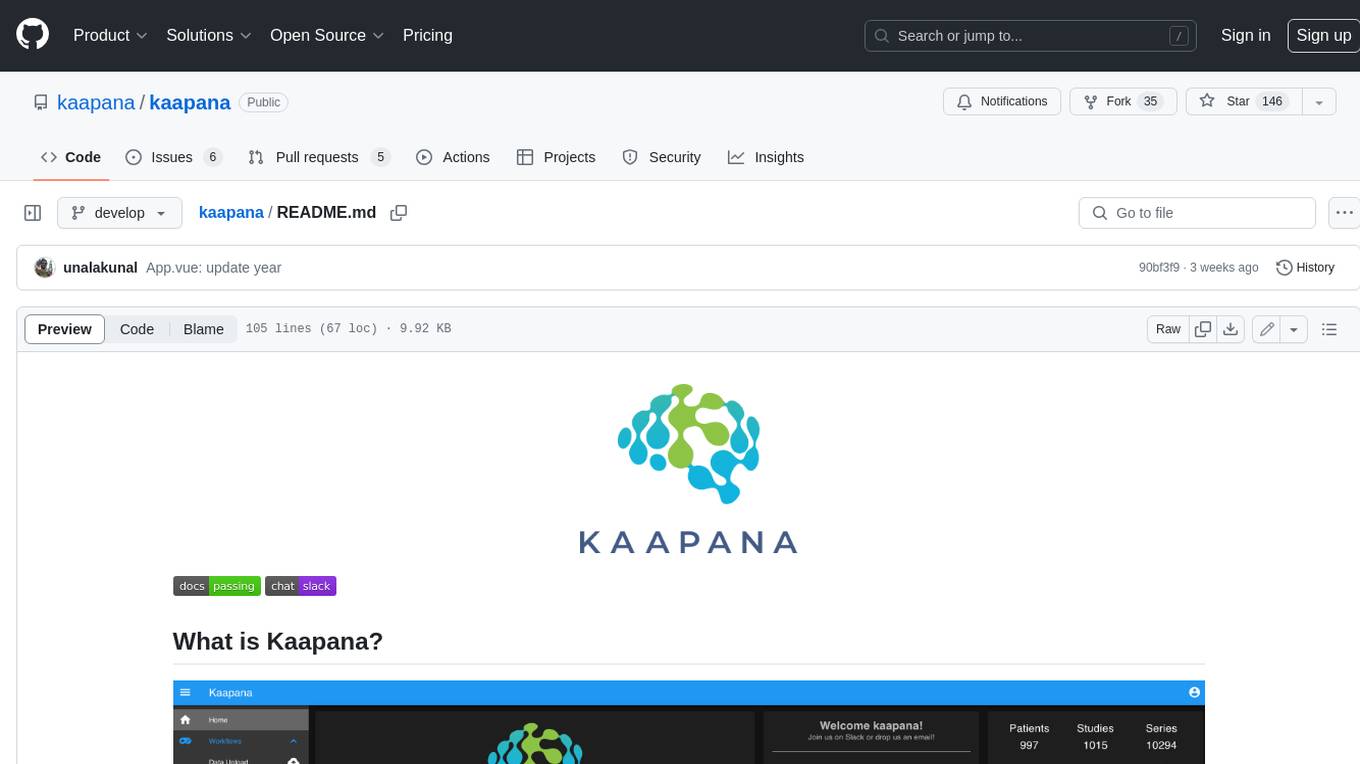
kaapana
Kaapana is an open-source toolkit for state-of-the-art platform provisioning in the field of medical data analysis. The applications comprise AI-based workflows and federated learning scenarios with a focus on radiological and radiotherapeutic imaging. Obtaining large amounts of medical data necessary for developing and training modern machine learning methods is an extremely challenging effort that often fails in a multi-center setting, e.g. due to technical, organizational and legal hurdles. A federated approach where the data remains under the authority of the individual institutions and is only processed on-site is, in contrast, a promising approach ideally suited to overcome these difficulties. Following this federated concept, the goal of Kaapana is to provide a framework and a set of tools for sharing data processing algorithms, for standardized workflow design and execution as well as for performing distributed method development. This will facilitate data analysis in a compliant way enabling researchers and clinicians to perform large-scale multi-center studies. By adhering to established standards and by adopting widely used open technologies for private cloud development and containerized data processing, Kaapana integrates seamlessly with the existing clinical IT infrastructure, such as the Picture Archiving and Communication System (PACS), and ensures modularity and easy extensibility.
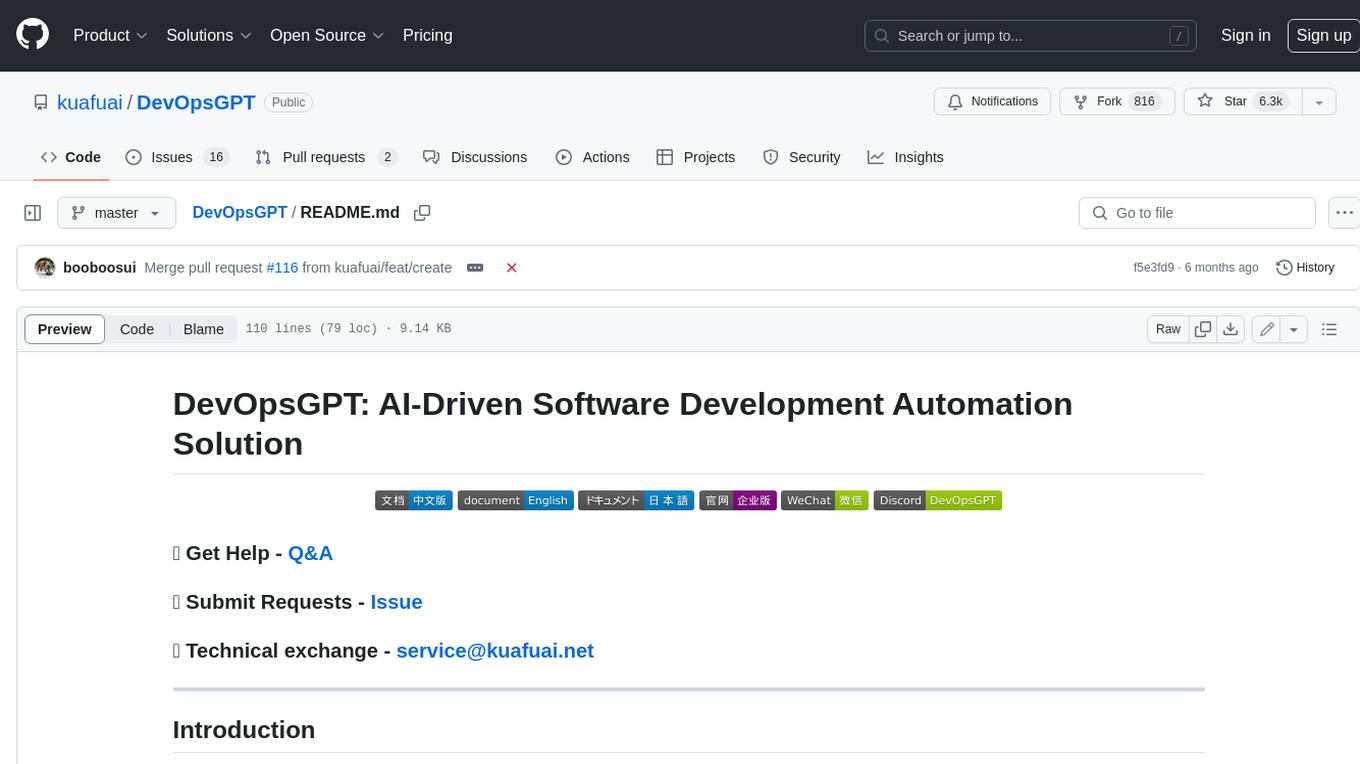
DevOpsGPT
DevOpsGPT is an AI-driven software development automation solution that combines Large Language Models (LLM) with DevOps tools to convert natural language requirements into working software. It improves development efficiency by eliminating the need for tedious requirement documentation, shortens development cycles, reduces communication costs, and ensures high-quality deliverables. The Enterprise Edition offers features like existing project analysis, professional model selection, and support for more DevOps platforms. The tool automates requirement development, generates interface documentation, provides pseudocode based on existing projects, facilitates code refinement, enables continuous integration, and supports software version release. Users can run DevOpsGPT with source code or Docker, and the tool comes with limitations in precise documentation generation and understanding existing project code. The product roadmap includes accurate requirement decomposition, rapid import of development requirements, and integration of more software engineering and professional tools for efficient software development tasks under AI planning and execution.
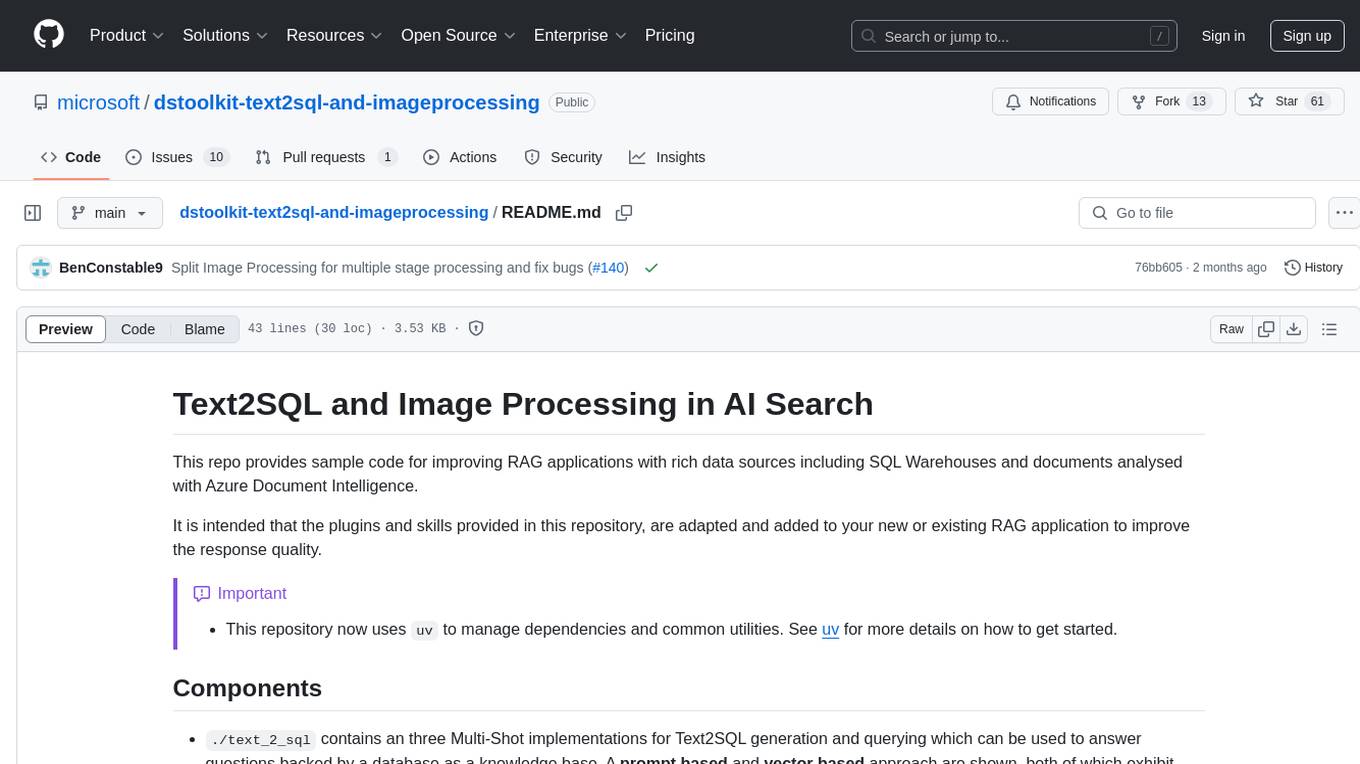
dstoolkit-text2sql-and-imageprocessing
This repository provides sample code for improving RAG applications with rich data sources including SQL Warehouses and documents analysed with Azure Document Intelligence. It includes components for Text2SQL generation and querying, linking Azure Document Intelligence with AI Search for processing complex documents, and deploying AI search indexes. The plugins and skills aim to enhance response quality in RAG applications by accessing and pulling data from SQL tables, drawing insights from complex charts and images, and intelligently grouping similar sentences.
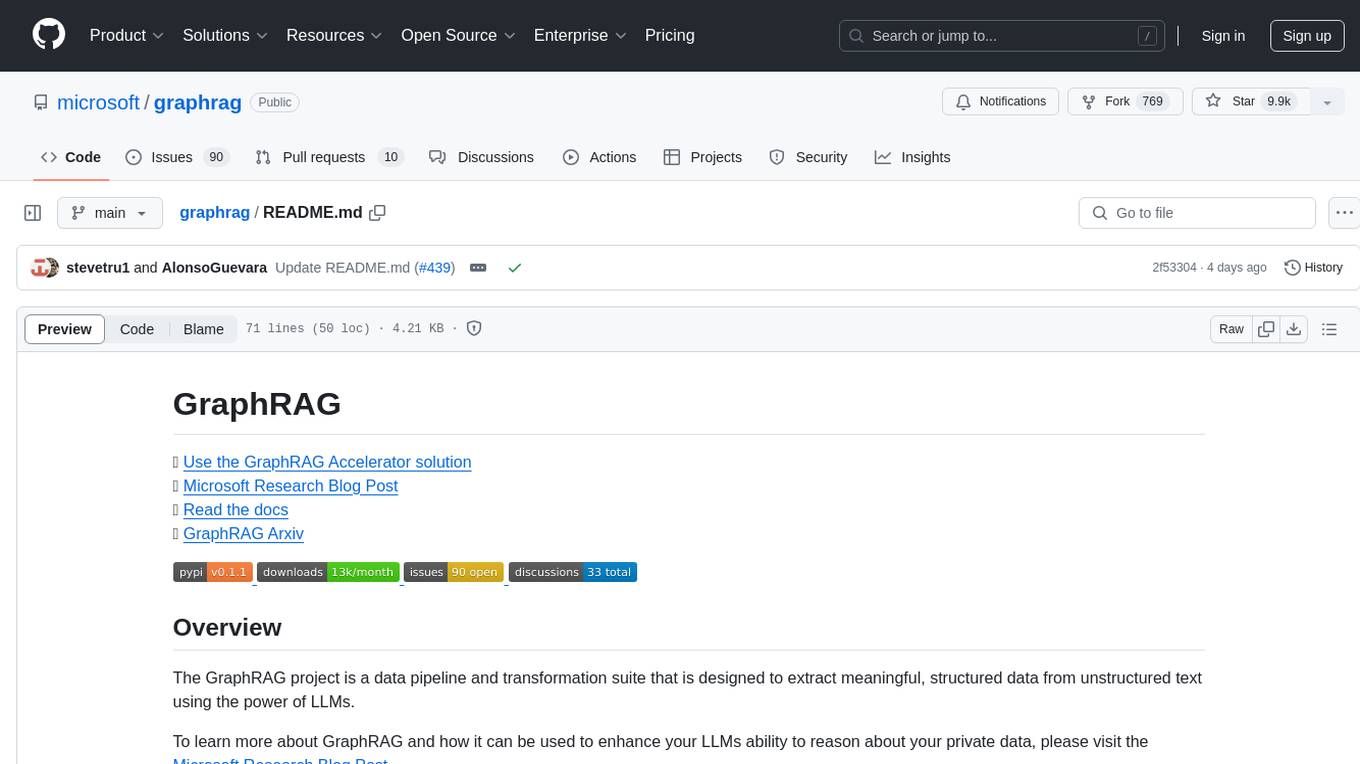
graphrag
The GraphRAG project is a data pipeline and transformation suite designed to extract meaningful, structured data from unstructured text using LLMs. It enhances LLMs' ability to reason about private data. The repository provides guidance on using knowledge graph memory structures to enhance LLM outputs, with a warning about the potential costs of GraphRAG indexing. It offers contribution guidelines, development resources, and encourages prompt tuning for optimal results. The Responsible AI FAQ addresses GraphRAG's capabilities, intended uses, evaluation metrics, limitations, and operational factors for effective and responsible use.
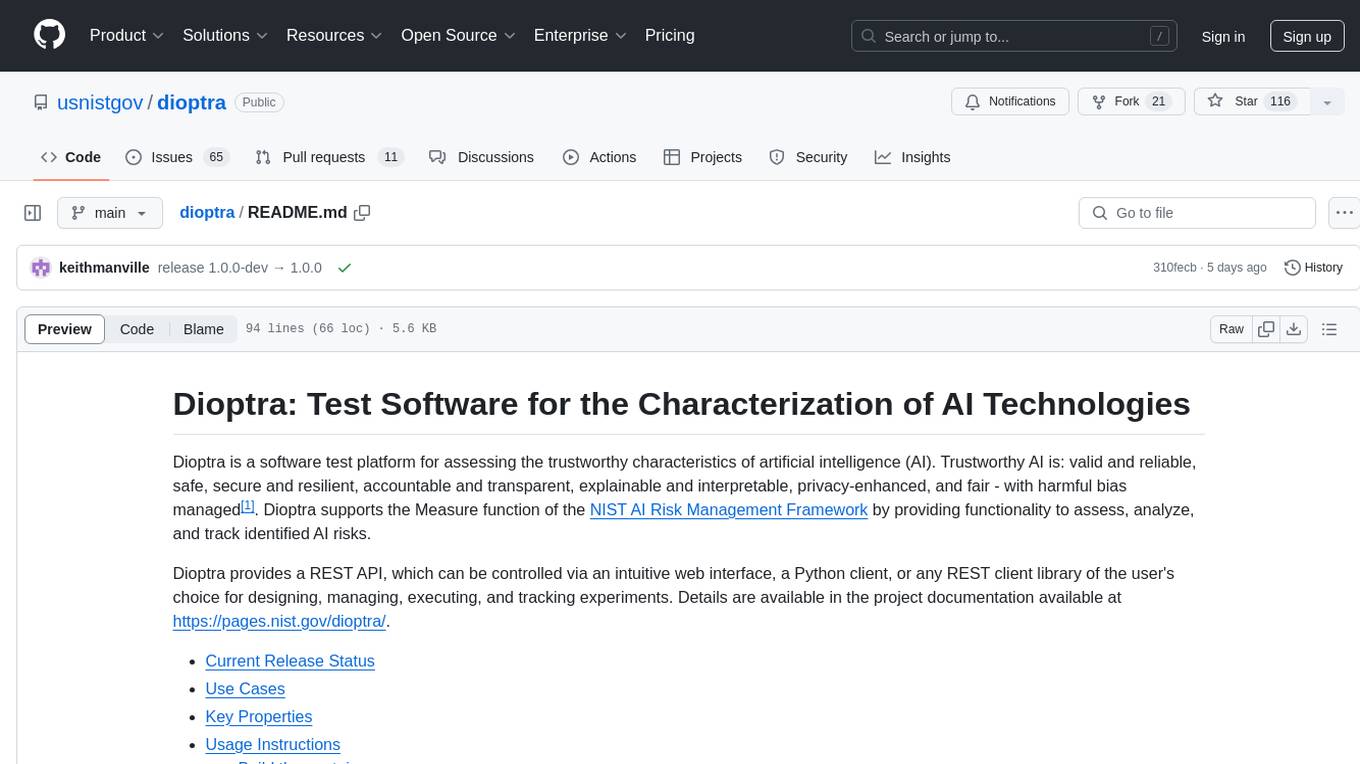
dioptra
Dioptra is a software test platform for assessing the trustworthy characteristics of artificial intelligence (AI). It supports the NIST AI Risk Management Framework by providing functionality to assess, analyze, and track identified AI risks. Dioptra provides a REST API and can be controlled via a web interface or Python client for designing, managing, executing, and tracking experiments. It aims to be reproducible, traceable, extensible, interoperable, modular, secure, interactive, shareable, and reusable.
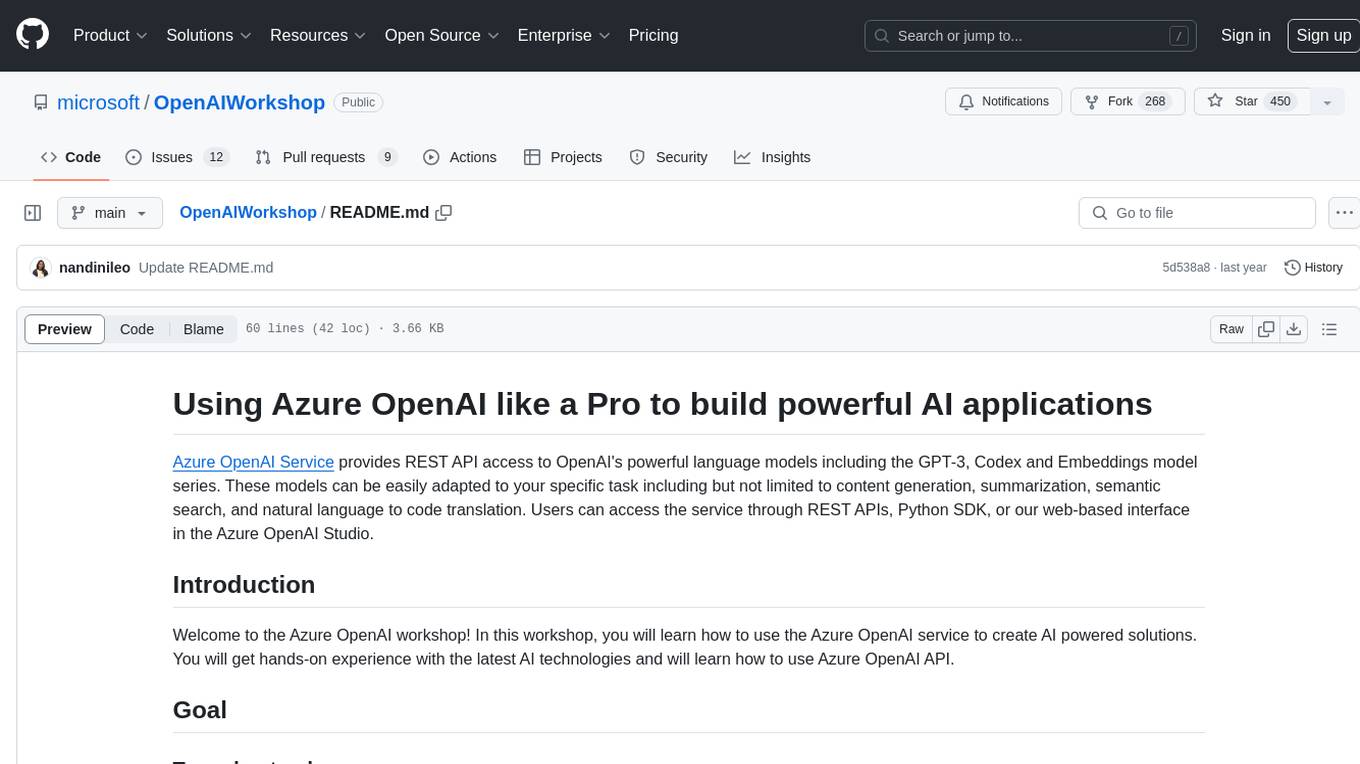
OpenAIWorkshop
Azure OpenAI Service provides REST API access to OpenAI's powerful language models including GPT-3, Codex and Embeddings. Users can easily adapt models for content generation, summarization, semantic search, and natural language to code translation. The workshop covers basics, prompt engineering, common NLP tasks, generative tasks, conversational dialog, and learning methods. It guides users to build applications with PowerApp, query SQL data, create data pipelines, and work with proprietary datasets. Target audience includes Power Users, Software Engineers, Data Scientists, and AI architects and Managers.
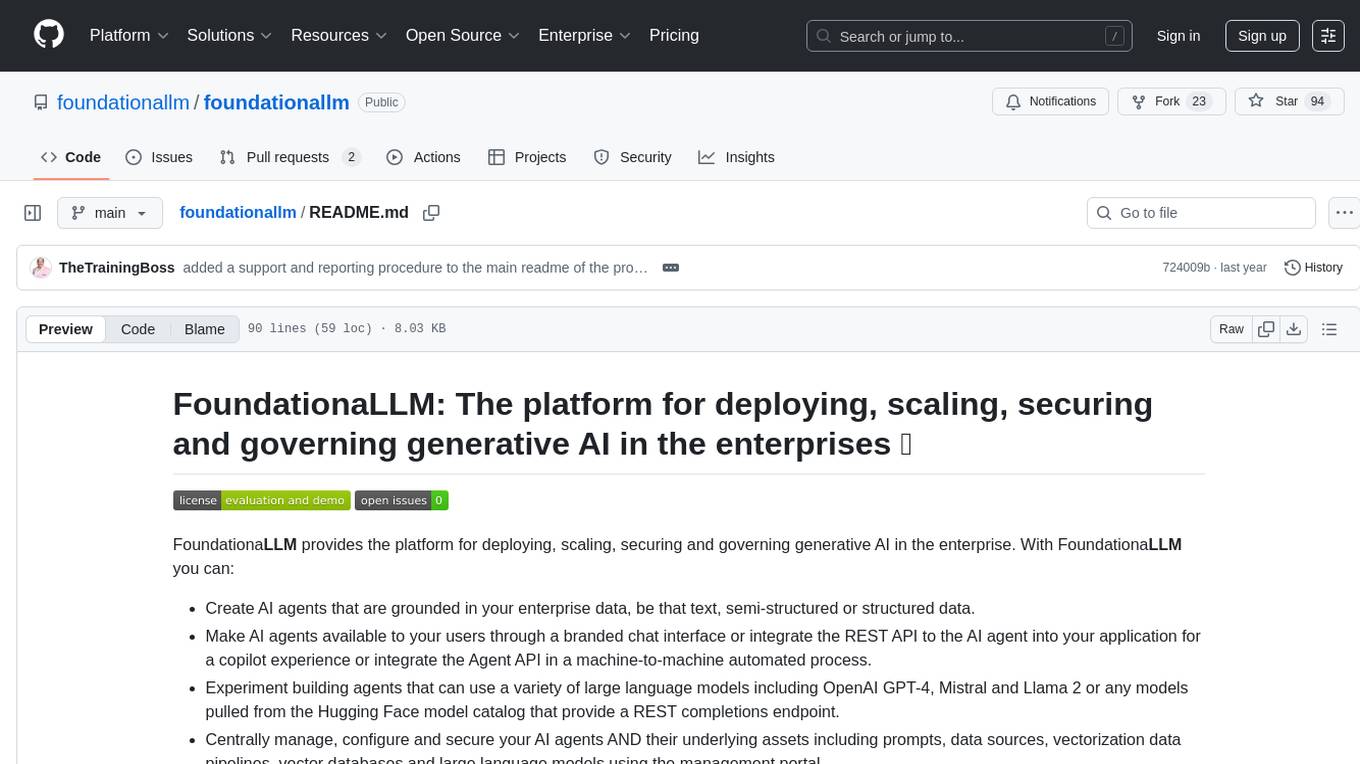
foundationallm
FoundationaLLM is a platform designed for deploying, scaling, securing, and governing generative AI in enterprises. It allows users to create AI agents grounded in enterprise data, integrate REST APIs, experiment with various large language models, centrally manage AI agents and their assets, deploy scalable vectorization data pipelines, enable non-developer users to create their own AI agents, control access with role-based access controls, and harness capabilities from Azure AI and Azure OpenAI. The platform simplifies integration with enterprise data sources, provides fine-grain security controls, scalability, extensibility, and addresses the challenges of delivering enterprise copilots or AI agents.
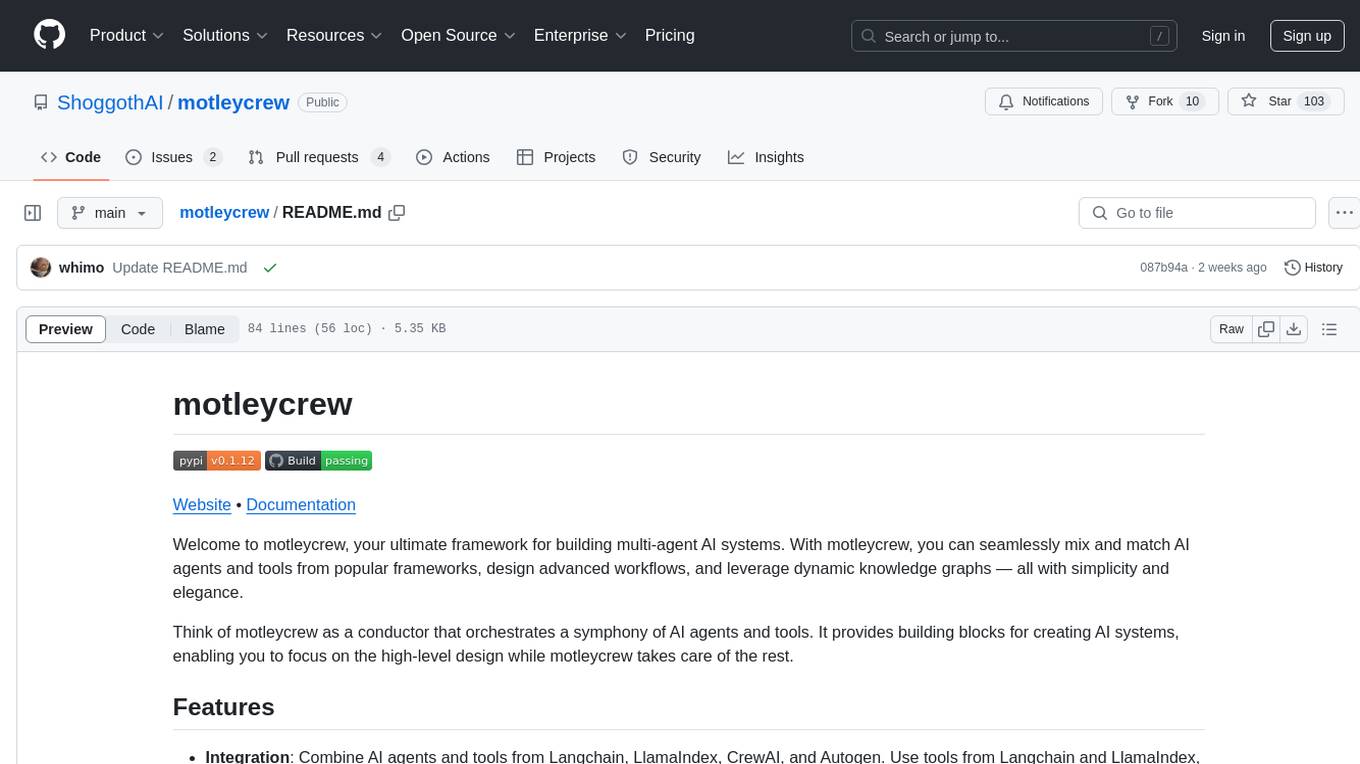
motleycrew
Motleycrew is an ultimate framework for building multi-agent AI systems, allowing users to mix and match AI agents and tools from popular frameworks, design advanced workflows, and leverage dynamic knowledge graphs with simplicity and elegance. It acts as a conductor orchestrating a symphony of AI agents and tools, providing building blocks for creating AI systems and enabling users to focus on high-level design while taking care of the rest. The framework offers integration with various tools, flexibility in providing agents with tools or other agents, advanced flow design capabilities, and built-in observability and caching features.
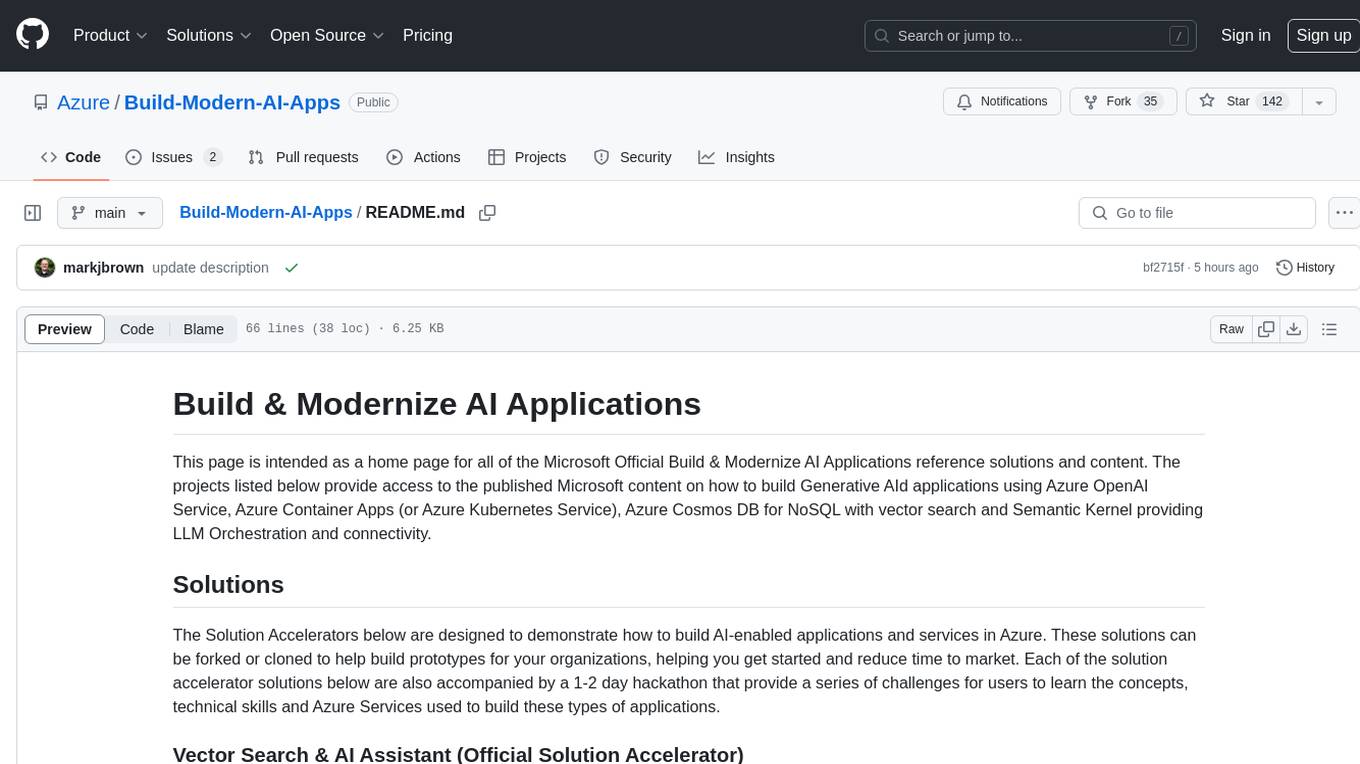
Build-Modern-AI-Apps
This repository serves as a hub for Microsoft Official Build & Modernize AI Applications reference solutions and content. It provides access to projects demonstrating how to build Generative AI applications using Azure services like Azure OpenAI, Azure Container Apps, Azure Kubernetes, and Azure Cosmos DB. The solutions include Vector Search & AI Assistant, Real-Time Payment and Transaction Processing, and Medical Claims Processing. Additionally, there are workshops like the Intelligent App Workshop for Microsoft Copilot Stack, focusing on infusing intelligence into traditional software systems using foundation models and design thinking.
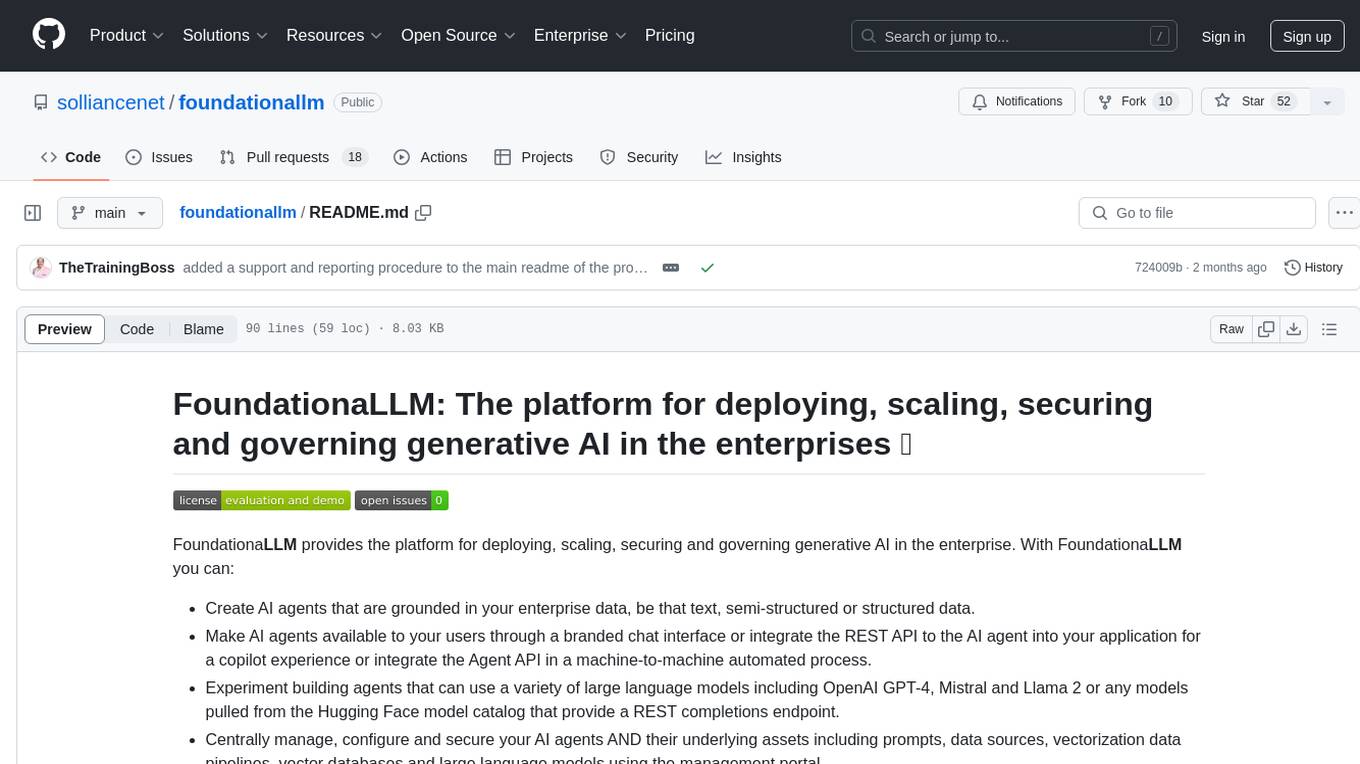
foundationallm
FoundationaLLM is a platform designed for deploying, scaling, securing, and governing generative AI in enterprises. It allows users to create AI agents grounded in enterprise data, integrate REST APIs, experiment with large language models, centrally manage AI agents and assets, deploy scalable vectorization data pipelines, enable non-developer users to create their own AI agents, control access with role-based access controls, and harness capabilities from Azure AI and Azure OpenAI. The platform simplifies integration with enterprise data sources, provides fine-grain security controls, load balances across multiple endpoints, and is extensible to new data sources and orchestrators. FoundationaLLM addresses the need for customized copilots or AI agents that are secure, licensed, flexible, and suitable for enterprise-scale production.
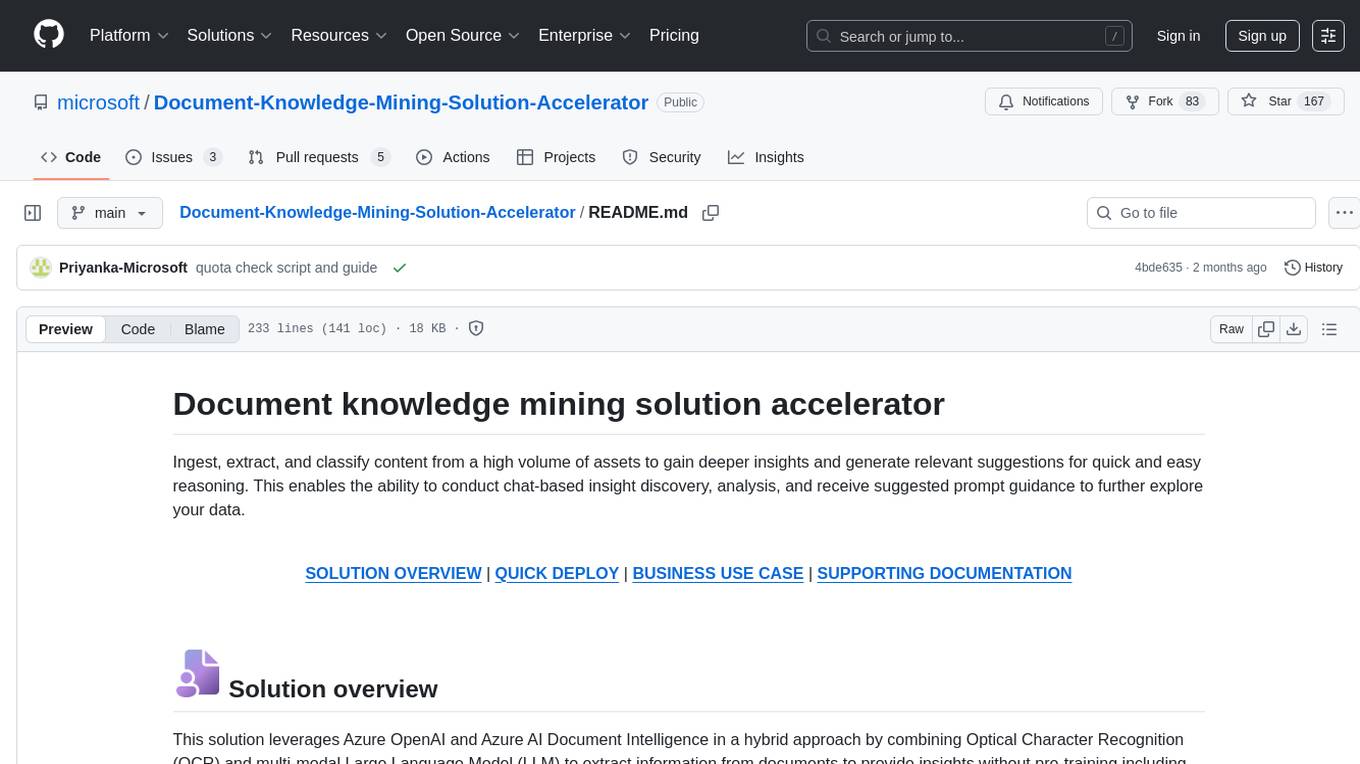
Document-Knowledge-Mining-Solution-Accelerator
The Document Knowledge Mining Solution Accelerator leverages Azure OpenAI and Azure AI Document Intelligence to ingest, extract, and classify content from various assets, enabling chat-based insight discovery, analysis, and prompt guidance. It uses OCR and multi-modal LLM to extract information from documents like text, handwritten text, charts, graphs, tables, and form fields. Users can customize the technical architecture and data processing workflow. Key features include ingesting and extracting real-world entities, chat-based insights discovery, text and document data analysis, prompt suggestion guidance, and multi-modal information processing.
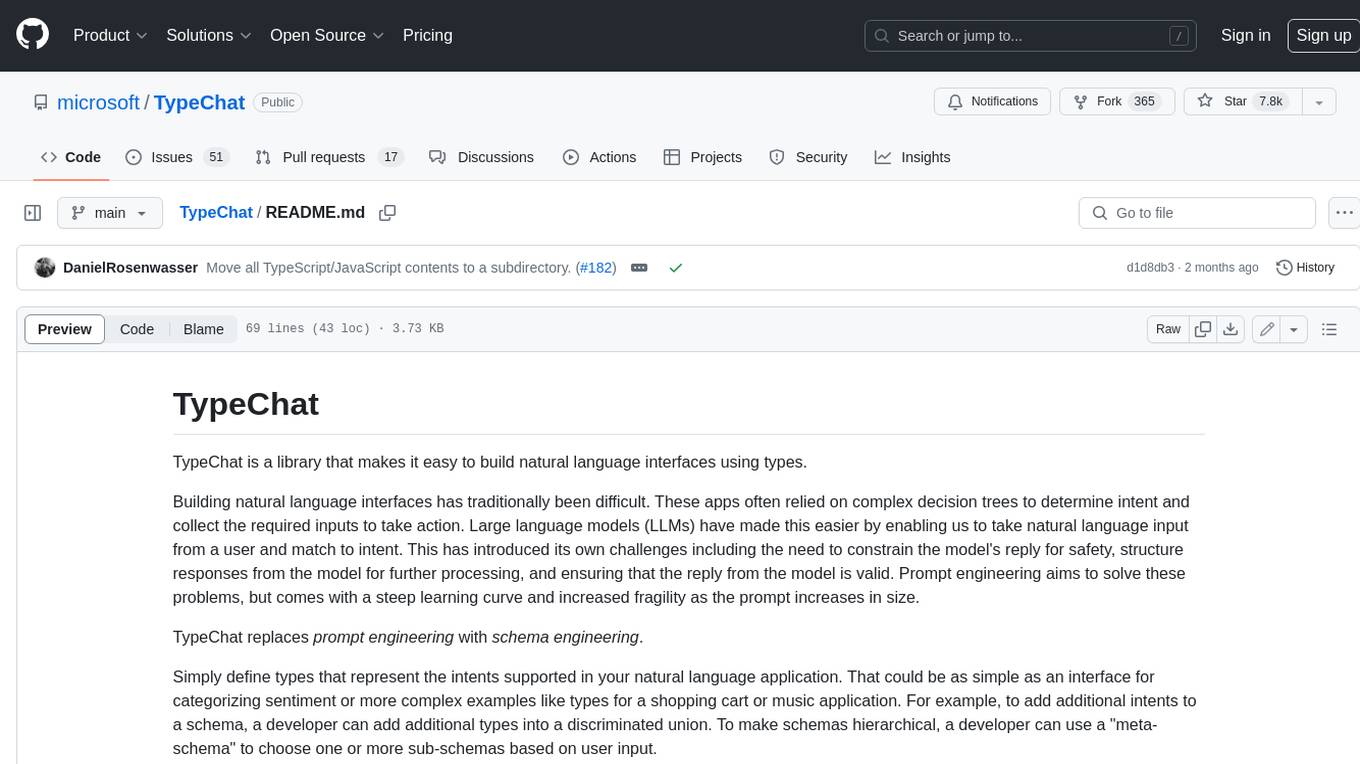
TypeChat
TypeChat is a library that simplifies the creation of natural language interfaces using types. Traditionally, building natural language interfaces has been challenging, often relying on complex decision trees to determine intent and gather necessary inputs for action. Large language models (LLMs) have simplified this process by allowing us to accept natural language input from users and match it to intent. However, this has introduced new challenges, such as the need to constrain the model's response for safety, structure responses from the model for further processing, and ensure the validity of the model's response. Prompt engineering aims to address these issues, but it comes with a steep learning curve and increased fragility as the prompt grows in size.
For similar tasks

jentic-public-apis
The Jentic Public APIs repository aims to collate all knowledge about the world's APIs into a detailed, comprehensive, structured documentation catalog designed for use by AI. It focuses on standardized OpenAPI specifications, Arazzo workflows, associated tooling, evaluations, and RFCs for extensions to open formats. The project is in ALPHA stage and welcomes contributions to accelerate the effort of building an open knowledge foundation for AI agents.
For similar jobs

sweep
Sweep is an AI junior developer that turns bugs and feature requests into code changes. It automatically handles developer experience improvements like adding type hints and improving test coverage.

teams-ai
The Teams AI Library is a software development kit (SDK) that helps developers create bots that can interact with Teams and Microsoft 365 applications. It is built on top of the Bot Framework SDK and simplifies the process of developing bots that interact with Teams' artificial intelligence capabilities. The SDK is available for JavaScript/TypeScript, .NET, and Python.

ai-guide
This guide is dedicated to Large Language Models (LLMs) that you can run on your home computer. It assumes your PC is a lower-end, non-gaming setup.

classifai
Supercharge WordPress Content Workflows and Engagement with Artificial Intelligence. Tap into leading cloud-based services like OpenAI, Microsoft Azure AI, Google Gemini and IBM Watson to augment your WordPress-powered websites. Publish content faster while improving SEO performance and increasing audience engagement. ClassifAI integrates Artificial Intelligence and Machine Learning technologies to lighten your workload and eliminate tedious tasks, giving you more time to create original content that matters.

chatbot-ui
Chatbot UI is an open-source AI chat app that allows users to create and deploy their own AI chatbots. It is easy to use and can be customized to fit any need. Chatbot UI is perfect for businesses, developers, and anyone who wants to create a chatbot.

BricksLLM
BricksLLM is a cloud native AI gateway written in Go. Currently, it provides native support for OpenAI, Anthropic, Azure OpenAI and vLLM. BricksLLM aims to provide enterprise level infrastructure that can power any LLM production use cases. Here are some use cases for BricksLLM: * Set LLM usage limits for users on different pricing tiers * Track LLM usage on a per user and per organization basis * Block or redact requests containing PIIs * Improve LLM reliability with failovers, retries and caching * Distribute API keys with rate limits and cost limits for internal development/production use cases * Distribute API keys with rate limits and cost limits for students

uAgents
uAgents is a Python library developed by Fetch.ai that allows for the creation of autonomous AI agents. These agents can perform various tasks on a schedule or take action on various events. uAgents are easy to create and manage, and they are connected to a fast-growing network of other uAgents. They are also secure, with cryptographically secured messages and wallets.

griptape
Griptape is a modular Python framework for building AI-powered applications that securely connect to your enterprise data and APIs. It offers developers the ability to maintain control and flexibility at every step. Griptape's core components include Structures (Agents, Pipelines, and Workflows), Tasks, Tools, Memory (Conversation Memory, Task Memory, and Meta Memory), Drivers (Prompt and Embedding Drivers, Vector Store Drivers, Image Generation Drivers, Image Query Drivers, SQL Drivers, Web Scraper Drivers, and Conversation Memory Drivers), Engines (Query Engines, Extraction Engines, Summary Engines, Image Generation Engines, and Image Query Engines), and additional components (Rulesets, Loaders, Artifacts, Chunkers, and Tokenizers). Griptape enables developers to create AI-powered applications with ease and efficiency.


